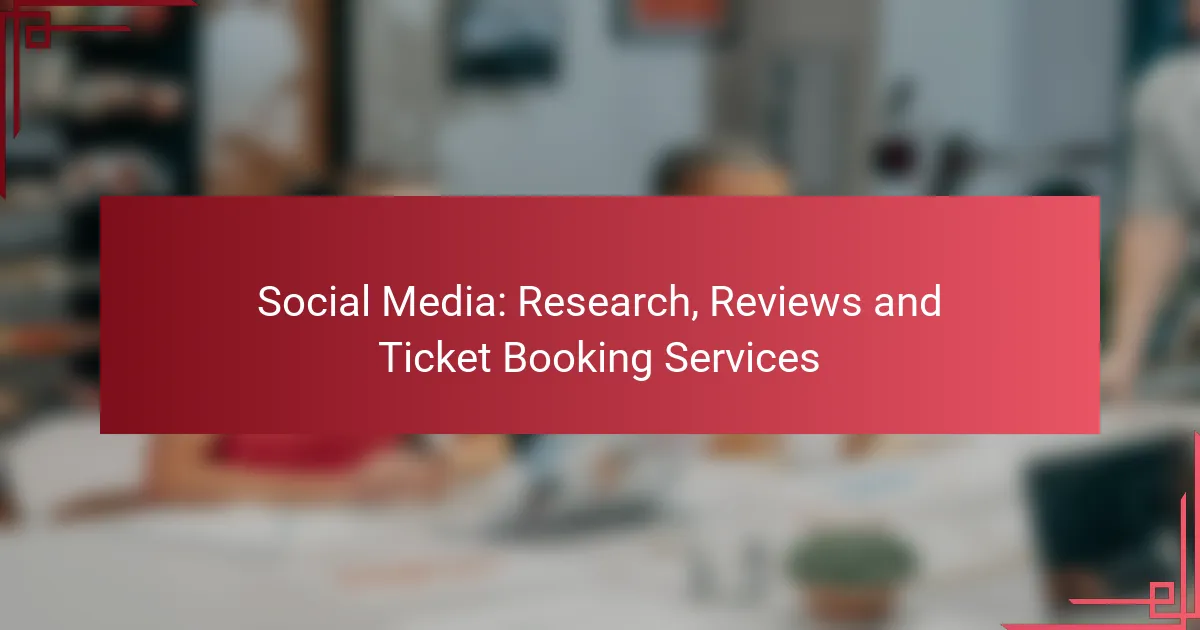Social media plays a pivotal role in enhancing ticket booking services by boosting visibility and enabling targeted advertising. Platforms like Facebook, Instagram, and Twitter offer unique advantages for promoting events, while leading services such as Eventbrite and Ticketmaster streamline the booking process through seamless integration. This synergy creates a more engaging experience for both event organizers and attendees, fostering real-time interaction and efficient ticket purchasing.
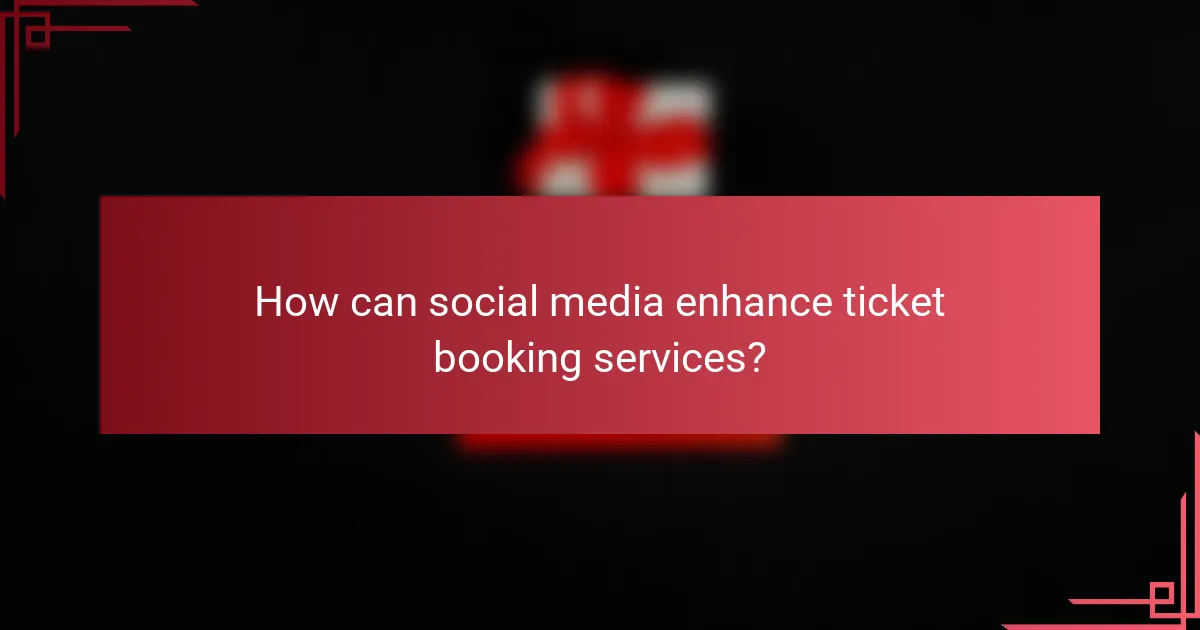
How can social media enhance ticket booking services?
Social media enhances ticket booking services by increasing visibility, enabling targeted advertising, fostering real-time engagement, facilitating influencer partnerships, and streamlining booking processes. These elements work together to create a more efficient and engaging experience for both event organizers and attendees.
Increased visibility for events
Social media platforms provide a vast audience for event promotion, allowing organizers to reach potential attendees who may not be aware of the event. By sharing event details, images, and updates, organizers can significantly boost visibility and interest.
Utilizing hashtags, event pages, and shares can amplify reach. For instance, a local concert can gain traction through shares from attendees, leading to organic growth in ticket sales.
Targeted advertising for specific audiences
Social media allows for precise targeting of advertisements based on user demographics, interests, and behaviors. This means that event organizers can tailor their marketing efforts to reach the most relevant audiences, increasing the likelihood of ticket sales.
For example, a theater production can target ads to users who have shown interest in similar performances, ensuring that promotional efforts are directed toward those most likely to attend.
Real-time customer engagement
Engaging with customers in real-time on social media helps build relationships and trust. Organizers can respond to inquiries, share updates, and address concerns promptly, enhancing the overall customer experience.
Live Q&A sessions or polls about event preferences can also be effective. This interaction not only informs attendees but also creates a sense of community around the event.
Influencer partnerships for promotions
Collaborating with influencers can significantly boost event visibility and credibility. Influencers can reach large, engaged audiences, making them valuable partners for promoting ticket sales.
For instance, a popular local influencer sharing their excitement about an upcoming festival can drive their followers to purchase tickets, leveraging their trust and reach for effective marketing.
Streamlined booking processes
Social media can simplify the ticket booking process by integrating direct purchase options within platforms. This reduces friction and makes it easier for users to buy tickets without navigating away from their social feeds.
Utilizing features like “Buy Now” buttons or linking to ticketing platforms directly in posts can enhance user experience. Ensuring that the booking process is quick and straightforward can lead to higher conversion rates and fewer abandoned carts.
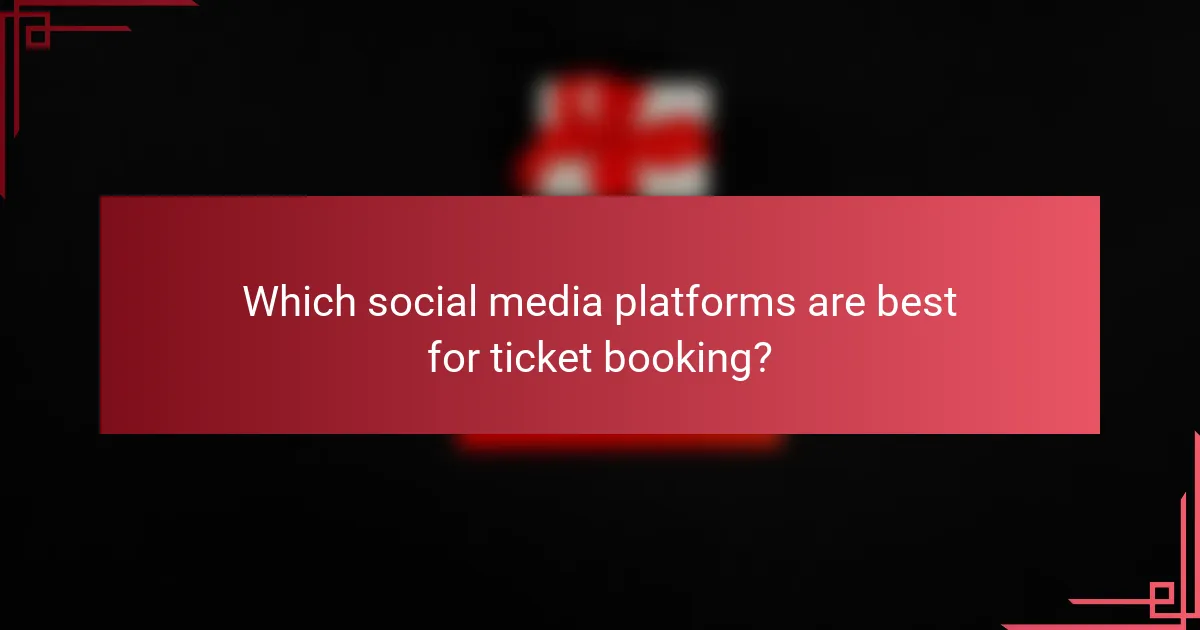
Which social media platforms are best for ticket booking?
Facebook, Instagram, Twitter, and LinkedIn each offer unique advantages for ticket booking. Choosing the right platform depends on your target audience and the type of event you are promoting.
Facebook for event promotion
Facebook is a powerful tool for promoting events and selling tickets due to its vast user base. You can create dedicated event pages that allow users to RSVP, share, and invite friends, increasing visibility.
Utilize Facebook Ads to target specific demographics, ensuring your event reaches the right audience. Consider using Facebook Live to engage potential attendees with sneak peeks or behind-the-scenes content.
Instagram for visual engagement
Instagram excels in visual storytelling, making it ideal for events that rely on aesthetics, such as concerts or festivals. High-quality images and videos can capture attention and drive ticket sales.
Use features like Stories and Reels to create engaging content that highlights your event. Collaborating with influencers can also expand your reach and attract a larger audience.
Twitter for real-time updates
Twitter is best for sharing real-time updates and engaging with your audience during an event. Its fast-paced nature allows you to communicate last-minute changes or promotions effectively.
Utilize hashtags related to your event to increase discoverability. Engaging with attendees through retweets and replies can foster a sense of community and encourage ticket purchases.
LinkedIn for professional events
LinkedIn is the go-to platform for professional and corporate events, such as conferences and workshops. It allows you to connect with industry professionals and promote networking opportunities.
Creating an event page on LinkedIn can help you reach a targeted audience interested in professional development. Share valuable content related to your event to attract attendees and establish credibility.
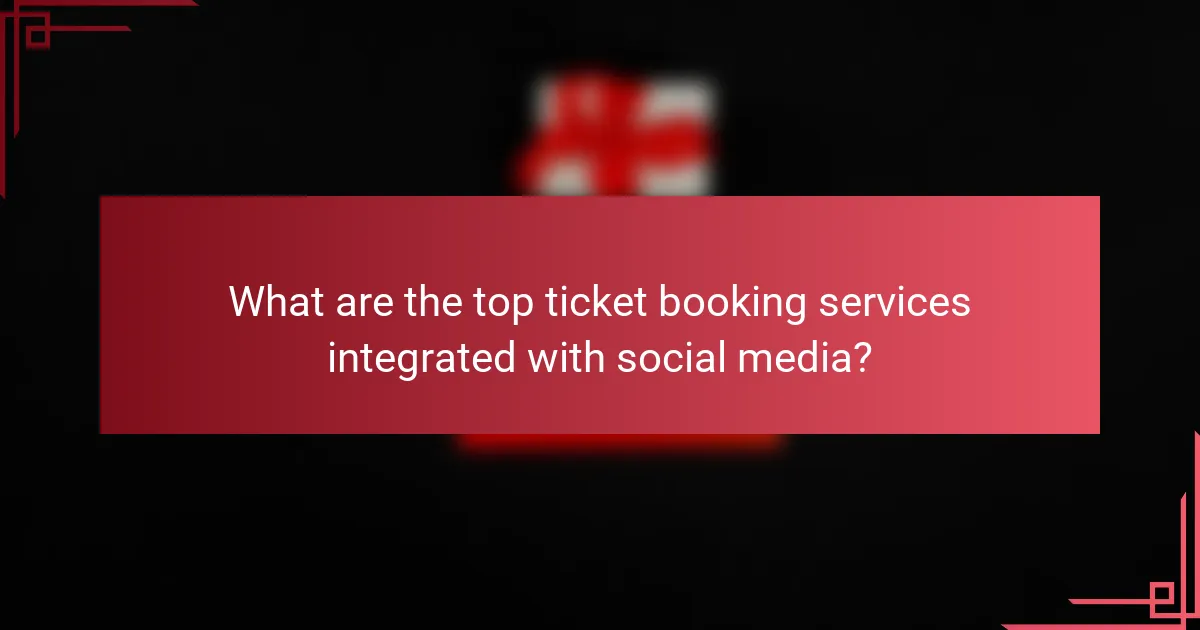
What are the top ticket booking services integrated with social media?
The leading ticket booking services that integrate with social media include Eventbrite, Ticketmaster, StubHub, and See Tickets. These platforms enhance user experience by allowing easy sharing, event promotion, and ticket purchasing directly through social media channels.
Eventbrite for event management
Eventbrite is a popular platform for organizing and managing events, offering tools for ticket sales and promotion. Users can create events, set ticket prices, and share them on social media, reaching a wider audience quickly.
One key feature is its integration with Facebook, allowing event creators to promote their listings directly on their pages. This can significantly increase visibility and attendance, making it a go-to choice for event organizers.
Ticketmaster for major events
Ticketmaster is well-known for selling tickets to major concerts, sports events, and theater productions. It provides a robust platform that integrates with social media, enabling users to share events and purchase tickets seamlessly.
When using Ticketmaster, be aware of dynamic pricing, which can fluctuate based on demand. This means prices may vary significantly, so checking frequently can help you snag better deals.
StubHub for resale options
StubHub specializes in ticket resale, allowing fans to buy and sell tickets for various events. Its social media integration lets users share listings, making it easier to find buyers or discover available tickets.
When using StubHub, consider the fees associated with selling tickets, which can impact your overall earnings. It’s advisable to set competitive prices to attract buyers while still making a profit.
See Tickets for diverse events
See Tickets offers a wide range of ticketing options for concerts, festivals, and other events. It supports social media sharing, which helps promote events and increase ticket sales.
This platform is particularly useful for smaller or independent events, as it provides flexible pricing options and promotional tools. Users should explore its features to maximize their event’s reach and sales potential.
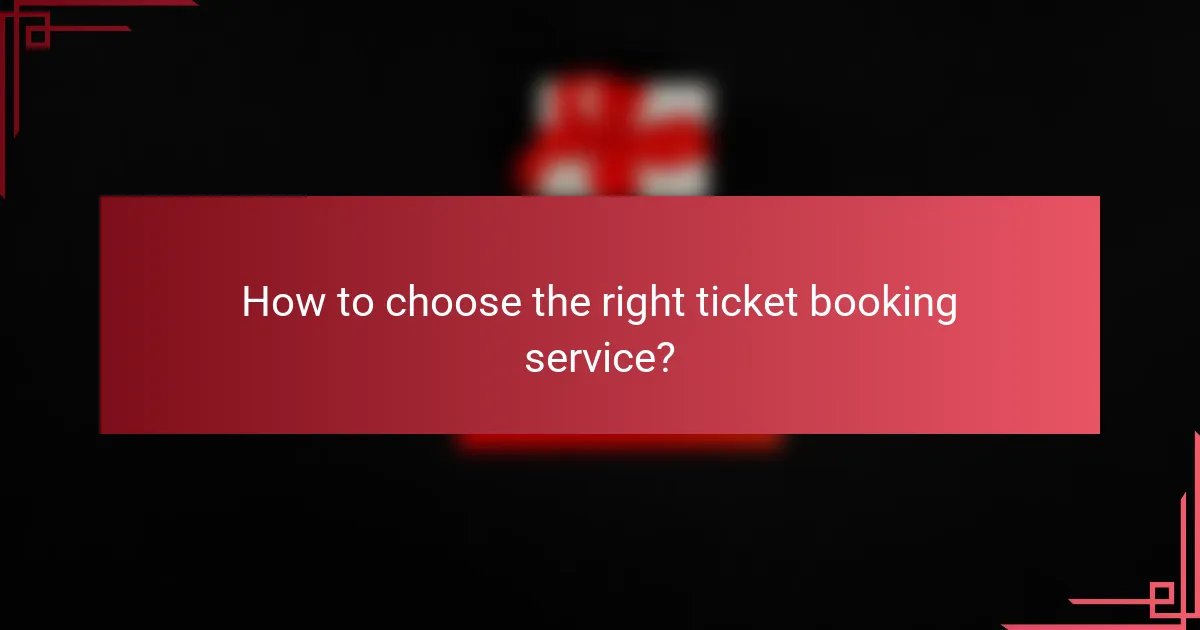
How to choose the right ticket booking service?
Choosing the right ticket booking service involves evaluating user feedback, comparing costs, and ensuring compatibility with social media platforms. Prioritize services that offer transparent pricing and reliable customer support to enhance your booking experience.
Evaluate user reviews and ratings
User reviews and ratings provide insights into the reliability and quality of a ticket booking service. Look for platforms with a high volume of positive feedback, ideally above 80%, as this indicates a strong reputation.
Check multiple sources for reviews, including social media, dedicated review sites, and forums. Pay attention to recurring themes in the feedback, such as ease of use, customer service responsiveness, and any issues with ticket delivery.
Compare service fees and commissions
Service fees and commissions can significantly impact the total cost of your ticket purchase. Some services charge a flat fee, while others take a percentage of the ticket price, which can range from 5% to 15%.
Make sure to read the fine print regarding any hidden fees that may apply at checkout. Comparing total costs across different platforms can help you find the most economical option for your needs.
Assess integration with social media
Integration with social media can enhance your ticket booking experience by allowing easy sharing and promotion of events. Look for services that offer direct links to platforms like Facebook or Instagram for seamless sharing.
Additionally, some services may allow you to log in using your social media accounts, simplifying the booking process. Ensure that the platform you choose supports the social networks you frequently use.
Check customer support options
Reliable customer support is crucial when issues arise during the booking process. Look for services that offer multiple support channels, such as live chat, email, and phone support, available during extended hours.
Consider testing the responsiveness of customer support before making a purchase. Reach out with a question to gauge their response time and helpfulness, ensuring you have assistance when needed.
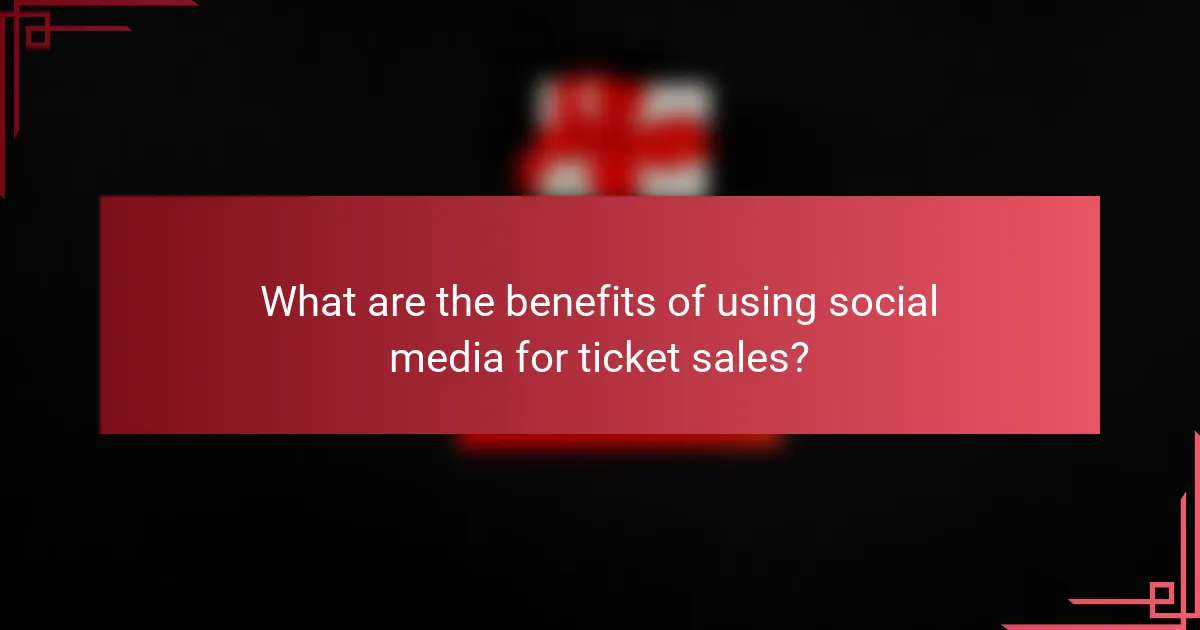
What are the benefits of using social media for ticket sales?
Using social media for ticket sales offers significant advantages, including increased visibility and direct engagement with potential customers. These platforms enable businesses to reach a wider audience while gathering valuable insights into customer preferences and behaviors.
Broader audience reach
Social media platforms like Facebook, Instagram, and Twitter allow ticket sellers to connect with a diverse audience across various demographics. By leveraging targeted advertising, businesses can promote events to specific groups based on interests, location, and behaviors, maximizing exposure.
For instance, a concert promoter can use social media ads to reach music fans in a particular city, ensuring that the marketing efforts are focused on those most likely to attend. This targeted approach can lead to higher ticket sales and better engagement rates.
Enhanced customer insights
Social media provides valuable data on customer interactions, preferences, and feedback. By analyzing engagement metrics such as likes, shares, and comments, businesses can gain insights into what types of events resonate with their audience.
For example, if a specific genre of music receives more engagement, promoters can tailor future events to align with those interests. Additionally, monitoring customer feedback can help identify areas for improvement, ensuring a better overall experience for attendees.
